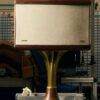
Rewrite
From September Says and

Mia Tharia in The Listeners
“I really like unusual stories from unusual perspectives, and characters that kind of dance in the grey area of morality.”
At only 19 years old, London-based actress Mia Tharia has had a year full of firsts: heading to Cannes with her feature film debut September Says, working alongside the likes of Jenna Ortega and Amy Adams in Taika Waititi’s forthcoming film adaptation of Klara and the Sun by Kazuo Ishiguro, and acting in her first series, the BBC’s The Listeners. Through these projects, the rising star has played characters both inward and outspoken, exploring family dynamics, ideas of mortality, teenage angst, and what it means to feel out of control. Through it all, she has approached each script empathetically, instinctually, and head on — making it clear her name is one we’ll see more of in the future.
Here, Mia Tharia tells Wonderland about her journey from Brixton Youth Theatre to London Film Festival with September Says, finding parts of herself in

Mia Tharia in The Listeners
Read the full interview…
Hi Mia! How are you doing?
I’m great, thank you!
You’ve had a really busy year, but tell us how you got to this point! When did you start acting and what’s your professional journey been like thus far?
I’ve been a part of a few youth theatres growing up and have always been glued to cinema screens. Things started to roll when I was 16 and the casting director Isabella Odoffin visited Brixton Youth Theatre to scout for September Says, which I was lucky enough to book. It’s been a bit of a whirlwind since then.
What typically draws you to scripts? Has it been different from project to project?
I really like unusual stories from unusual perspectives. And characters that kind of dance in the grey area of morality.
Specifically with The Listeners, how did you come to be involved in the project? What was it about your character that resonated with you? How did you get into character?
I self-taped, and got a zoom recall, where I met Jordan Tannahill the writer, Janicza Bravo the director and Shaheen Baig the casting director. That night I got the call I booked it. It’s such a rich script with so many exciting people involved. Ashley is in the middle of a family dynamic that’s intense, she’s watching her mum pull away and become part of something she keeps being told she won’t understand. I think there’s that relatable aspect of being a young person, kept out of conversations and explanations. But she’s active. She won’t back down. I listened to a hell of a lot of Florence and the Machine and read the book, which is brilliantly written.
Was this process similar to how you approached September Says?
September Says is a film deeply rooted in the dynamic of Sheela, September and July. I found so much of the character in rehearsal, working with Rakhee Thakrar, Pascale Kann and our director Ariane Labed. I read the book before my audition which is beautifully written, and there’s a lot written from the perspective of July which was a gift.
Is there a scene you’re most proud of in that film?
There’s a dancing scene where July struggles to follow a routine as impressively as September. I’m proud my dyspraxia has finally had its moment to shine.
We’re so excited about Klara and the Sun! What can you tell us about the film at this point?
The film is an adaptation of the Kazuo Ishiguro novel, directed by Taika Waititi about an AF (artificial friend) called Klara being adopted into this family. I play Josie, she’s incredibly intelligent because of a process called Lifting, but this has made her quite unwell. It was insane to be working with the people I got to work with. They are all masters of their craft. I feel incredibly lucky.
What has the balance been of staying true to the book and making the character your own?
The book is so moving, and I’ve taken so much from it. As well as referring to the book, I found the character through working closely with Taika and the cast. She’s a complex character grappling with her own mortality, and of course, good old teenage angst.
Are there any commonalities you’ve found in your roles in the three previously mentioned projects?
I think they all feel out of control. Having people making decision for them, not including them in the conversation.
Is there anything you’ve learned from your co-stars in these projects that you’ll take with you moving forward?
Trust your instincts, and be kind.
in HTML format, including tags, to make it appealing and easy to read for Japanese-speaking readers aged 20 to 40 interested in fashion. Organize the content with appropriate headings and subheadings (h1, h2, h3, h4, h5, h6), translating all text, including headings, into Japanese. Retain any existing
tags from
From September Says and

Mia Tharia in The Listeners
“I really like unusual stories from unusual perspectives, and characters that kind of dance in the grey area of morality.”
At only 19 years old, London-based actress Mia Tharia has had a year full of firsts: heading to Cannes with her feature film debut September Says, working alongside the likes of Jenna Ortega and Amy Adams in Taika Waititi’s forthcoming film adaptation of Klara and the Sun by Kazuo Ishiguro, and acting in her first series, the BBC’s The Listeners. Through these projects, the rising star has played characters both inward and outspoken, exploring family dynamics, ideas of mortality, teenage angst, and what it means to feel out of control. Through it all, she has approached each script empathetically, instinctually, and head on — making it clear her name is one we’ll see more of in the future.
Here, Mia Tharia tells Wonderland about her journey from Brixton Youth Theatre to London Film Festival with September Says, finding parts of herself in

Mia Tharia in The Listeners
Read the full interview…
Hi Mia! How are you doing?
I’m great, thank you!
You’ve had a really busy year, but tell us how you got to this point! When did you start acting and what’s your professional journey been like thus far?
I’ve been a part of a few youth theatres growing up and have always been glued to cinema screens. Things started to roll when I was 16 and the casting director Isabella Odoffin visited Brixton Youth Theatre to scout for September Says, which I was lucky enough to book. It’s been a bit of a whirlwind since then.
What typically draws you to scripts? Has it been different from project to project?
I really like unusual stories from unusual perspectives. And characters that kind of dance in the grey area of morality.
Specifically with The Listeners, how did you come to be involved in the project? What was it about your character that resonated with you? How did you get into character?
I self-taped, and got a zoom recall, where I met Jordan Tannahill the writer, Janicza Bravo the director and Shaheen Baig the casting director. That night I got the call I booked it. It’s such a rich script with so many exciting people involved. Ashley is in the middle of a family dynamic that’s intense, she’s watching her mum pull away and become part of something she keeps being told she won’t understand. I think there’s that relatable aspect of being a young person, kept out of conversations and explanations. But she’s active. She won’t back down. I listened to a hell of a lot of Florence and the Machine and read the book, which is brilliantly written.
Was this process similar to how you approached September Says?
September Says is a film deeply rooted in the dynamic of Sheela, September and July. I found so much of the character in rehearsal, working with Rakhee Thakrar, Pascale Kann and our director Ariane Labed. I read the book before my audition which is beautifully written, and there’s a lot written from the perspective of July which was a gift.
Is there a scene you’re most proud of in that film?
There’s a dancing scene where July struggles to follow a routine as impressively as September. I’m proud my dyspraxia has finally had its moment to shine.
We’re so excited about Klara and the Sun! What can you tell us about the film at this point?
The film is an adaptation of the Kazuo Ishiguro novel, directed by Taika Waititi about an AF (artificial friend) called Klara being adopted into this family. I play Josie, she’s incredibly intelligent because of a process called Lifting, but this has made her quite unwell. It was insane to be working with the people I got to work with. They are all masters of their craft. I feel incredibly lucky.
What has the balance been of staying true to the book and making the character your own?
The book is so moving, and I’ve taken so much from it. As well as referring to the book, I found the character through working closely with Taika and the cast. She’s a complex character grappling with her own mortality, and of course, good old teenage angst.
Are there any commonalities you’ve found in your roles in the three previously mentioned projects?
I think they all feel out of control. Having people making decision for them, not including them in the conversation.
Is there anything you’ve learned from your co-stars in these projects that you’ll take with you moving forward?
Trust your instincts, and be kind.
and integrate them seamlessly into the new content without adding new tags. Ensure the new content is fashion-related, written entirely in Japanese, and approximately 1500 words. Conclude with a “結論” section and a well-formatted “よくある質問” section. Avoid including an introduction or a note explaining the process.


